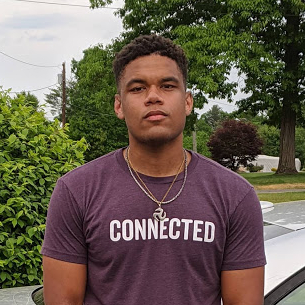 Please check out the Segal Program Fellows in Action Page for more information on highlights from our Fellows including this month's Segal Fellow Spotlight on 2016 Heller MPP Segal Fellow Dan McConvey.
Please check out the Segal Program Fellows in Action Page for more information on highlights from our Fellows including this month's Segal Fellow Spotlight on 2016 Heller MPP Segal Fellow Dan McConvey.
Creating a Playlist for Racial Justice

On Wednesday 2/17/21, Program Coordinator Kyle Richard spoke with 2021 Heller MPP Segal Fellow Pierrce Holmes to discuss the development of material for The Heller School’s Equity, Inclusion, and Diversity (EID) Team’s 21-Day Racial Equity Challenge: Below is an excerpt from that conversation.
KR: I want to thank you very much, Pierrce, for joining me, and I want to thank you for deciding to elucidate this playlist that you came up with for the 21-Day Challenge in partnership with Heller’s EID team, the first question I have is, what was the genesis of this idea of the racial justice, 21-day playlist? What was the overarching goal that you're trying to get out of it?
PH: From my job as a Graduate Assistant at Heller’s Equity Inclusion Diversity office, I was tasked with going through the 21-day challenge myself, first of all, and then seeing how I felt it could be improved, because it was then going not only to be applied to the seminar that we held in the winter for four weeks, but also disseminated across Heller, and hopefully Brandeis at large. What I noticed when I went through the challenge is that it was overwhelmingly deficit-based, in terms of giving people a framework. Especially from an educational perspective, it is important because it gives people perspective on how so much of society functions to the detriment of people of color and Black people, but there's a lot of strength that wasn’t really alluded to in the initial challenge.
So I took it upon myself, the first thing I noticed (and I'm just biased because I love music and anything like that really), was that there was only one day that had any music and, even then, it was only a couple of songs, and a couple of poems and, for that matter, one of them was by the Beatles. which no disrespect to the Beatles, but they aren’t exactly the pinnacle of black strength. My logic was just: if I can take a lot of music from across the spectrum, then it gives not only people agency, I think (Just by virtue of it being people’s stories or experiences coming from their own mouths), but just for the listener, I think you get a better sense of the culture and the people. Because everything, all these articles, are great, and I think they really do an excellent job of leading people down this challenge of analyzing racial equity and being more conscious about it, but, just like if you were learning a language you would want to listen to a lot of the music and you really want to immerse yourself in it; I think when you're talking about engaging with racial equity work, part of it is just people getting comfortable with things they really don't interact with a lot, or that many people don't interact with a lot at least, and I think music was a great way to do that.
KR: Excellent so I, so I guess we'll start from square one, like how did you approach making it? With this almost Herculean task of encompassing all the ideas of strength and Black excellence into a playlist, how did you go about it, what was your approach to doing it?
PH: The first thing I did was come up with songs on my own. I'm just thinking of a bunch of stuff that I think people could appreciate, in this context, especially. There's no real rhyme or reason; I'm just kind of rattling off songs from a bunch of different genres of different fields and different tones, and then I have, you know, I have a good few friends of color in my [MPP] cohort, so I reached out to them, and they gave me a bunch of suggestions. Those are definitely reflected in there, but after that I really just took whatever I could think of honestly, again with the only goal being: let’s make sure there's men, make sure there's women and make sure there's a little bit of LGBTQ voice in there. Let me make sure that I'm touching on love songs, more hard gangsta rap type stuff. Let me make sure that there's something small, something fun, works that would be considered more high or a little bit more political or conscious... really just trying to run the gambit, so that people could experience all of it.
KR: I love it, and I think it's interesting that, just like you said, the variety of songs you put in are not just a variety of artists or musical genres, but also an eclectic range of emotions of the songs too. Some of them have anger, some sadness, some of them are powerful and passionate, some of happy. I think that's a really cool way that you approach this.

PH: For starters, all the music that Black people make, all the contributions that Black people have made, some music that's good in general, but also, it fits within the context of that challenge. I want people just to get a sense of everything that happened within the Black experience, you know, happiness, pain, sorrow, love, infidelity... whatever it is really, just getting the sense that we're all people too. There are songs in there probably, just like Chief Keef (I think some of my older colleagues, my boss, may not have enjoyed some of the music on there for its lyrical content), but I think that was the point to it, you know? Whoever it is, we can't pick and choose what's a part of the culture. You know, the culture isn't owned or whatever. It can be highly conscious and political, so it's not just Kendrick Lamar and Public Enemy, but also happy songs that display joy.
KR: Yeah, you had Earth, Wind and Fire’s “September,” which is, in my opinion, the happiest song I've ever heard in my entire life.
You also said that you did this in cooperation with other Fellows. Maybe talk to me about some of the Segal Fellows that you worked with, and what songs they picked in your playlist. What was it like collaborating with them, and what was their input?
PH: Yeah, so I approached a big group of them from my MPP Cohort, but Vandita, and two other Fellows Andrea and Adam were the ones that got back to me. Andrea got to me initially, and asked me, “What's the context? What are we really trying to do?” I was like, “Anything you think ties into the Black experience.” A lot of people took that to mean Black joy. I was just going for whatever came in people's heads. Adam (Jones) suggested Kanye West’s “We don't care,” which is an excellent addition. I know Andrea suggestedTobe Nwigwe. There were a couple of songs, like “C.R.E.A.M” by Wu Tang which, of course I was definitely thinking about. We already get along great, and I’m glad they were willing to help out.
KR: If you had to pick one song that you think exemplifies the theme of what you were trying to gain out of this activity, which one would that be?
PH: I think one would be “Family Reunion,” by Jill Scott. My dad used to play that record all the time, and I just always was drawn to that song. It made me think of my family, and just everybody hanging out. All the random nonsense and conversation. So I've always appreciated that song. But I feel like that exemplifies a lot of people, especially a lot of Black families.

KR: Finally what are some ways you feel your Segal Experience has been helpful for you and helpful in thinking about how you wish to make change through activities such as this one?
Pierrce Holmes: Thus far, it's just been a blessing to be amongst such driven and accomplished people that are really working towards goals that are similar to mine. All of the conversations we have give me extra incentive to reflect on myself and my place in this fight against injustice. It’s really an extra support system and somewhere that I can find a ton of inspiration, because everybody is coming at things from a different perspective. I think just being present in this space and doing these different activities will have a profound impact on how I approach my work and efforts moving forwards.
